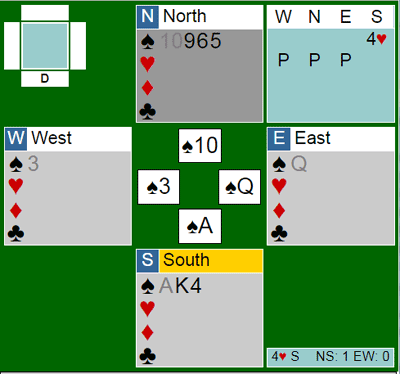
 Ok that’s what most people would do.
But can you think of any other more deceptive way to play the suit?
Suppose you would rather not lose any tricks in the suit before setting up your trick.
Imagine how it would look to the opening leader if you simply lead a small card back toward dummy. Step in the shoes of the opening leader.
He has led low from Jxxx. Dummy had T9xx, the trick went T, Q, A.
Now you lead back toward the 9 in dummy immediately.
Well he can’t tell who has the king. His partner was supposed to have played the queen with king queen, so his partner can easily have it. And in fact, he will be sure his partner has the king. Because why would you be ducking this trick to his jack and allowing him to give his partner a ruff?
So he will probaby duck his jack, lest it crash under his partner’s king. His partner might have KQ doubleton.
This lets you lose no tricks in the suit, through creative deceptive play.
I will go over this example more carefully to make sure everyone understands. Here is everyone’s holding in the key suit.
Leader: J832
Dummy: T965
3rd hand: Q7
Declarer: AK4
Leader leads the 3 (suppose they play 3/5th leads against suit contracts)
Declarer plays the T from dummy, normal play to force an honor.
3rd hand plays the Q
You win the A.
First thing is, always win the ace from ace-king against suit contracts, because the opponents both know you have it. The leader wouldn’t underlead an ace, and if third hand had the ace he would have won the trick.
So you win the ace, and at this point neither opponent can be sure who has the king. You can take advantage of that uncertainty.
The player on your right may have held KQ doubleton, for example. He would have played the queen with that.
So the leader can’t rule out that possibility. He is in the dark as to who has the king.
If you lead a little card back to dummy immediately, without taking the king first. It is POSSIBLE for the leader to go up with his jack, and now give his partner a ruff in the suit.
But he doesn’t know that. He is going to be worried that if he plays the jack, it will crash under his partner’s king. He doesn’t know his partner holds Q7, it could be KQ doubleton.
So almost always, this player will duck his jack, allowing the 9 to win in dummy.
You can fool the opponents into taking no tricks in this suit.
That is the essence of deceptive play. Playing a suit in a way that makes it look different than it is.
Ok let’s try one more.
This takes guts, so never be afraid!
You open 1NT, your partner bids 3NT. They lead a low spade on your left. Here is the spade situation.
65 in dummy
(they led the 3), your hand is AKJ tight of spades.
Already it seems obvious to you they have led from four or five cards to the queen. Well great, right into your tenace. We love when that happens
But what if you have a finesse to take, that if it loses, goes into the opening leader’s hand? Say QJT9x of diamonds in dummy, Axxx in your hand.
Think back to the lead. They led a low spade, you play low from dummy, suppose it goes T (ten) on your right, of course most players would eagerly win the jack.
Now you go to dummy to take that diamond finesse. Suppose it loses.
The player on your left knows his lead has worked out badly.
His partner can’t have the A or K, or he would have played it on the lead rather than letting you win your jack. He knows you have AKJ in this suit. He is going to switch to another suit now.
Well maybe that’s bad for you. You might not want a switch to another suit. Maybe your hearts are completely unguarded, 632 in dummy, Q7 in your hand. He doesn’t know it, but if he switches to hearts they will run the suit.
So if you will have enough tricks anyway, let’s consider handling the very first trick differently.
Spade lead, xx in dummy, you play low, ten on your right. Win the king!
Think of how this looks to the opening leader. (The essence of deceptive play, always think how it looks to the opponents)
He has led from five to the queen, Qxxxx. Dummy played low, his partner played the T, and you won the K. Well now he is going to be certain his partner has the J as well, because you didn’t win with it.
So when you go to dummy, and take your diamond finesse, and it loses, he is likely to continue spades, thinking his opening lead worked well. Here is a full hand.
Click NEXT in the diagram to follow the play
—
We are going to do a little giveaway now. I usually take questions at this point. Afterwards, I will pick the question I like best, and whoever asked it wins a free copy of Fred’s new book!
I don’t know who is asking the questions since they go through Diana, so everyone has a fair chance.
Q1: I find robots make a lot of deceptive plays. Do you remember a deal where bot tricked you?
A: This happens quite often. The bots don’t make plays like the ones I describe. These plays would lose tricks if the opponents could see all the hands. The bot doesn’t realize his opponent will have a hard time figuring out his hand in that way.
The bot makes deceptive plays like, randomizing spot cards. If the opponent leads a 3, and the bot holds the 2 as declarer, he will often withhold the 2 so it’s not clear whether the leader led his lowest card or not. Or the bot will give false count very often.
GIB is very good at things like that. That is a little different than what I was discussing.
My advice, just ignore spot cards from the robot.
Q2: As there are so many suit combinations, is it worth my time to learn all the various coups? Idea is it better to recognize a few situations rather than learn 1000?
A: If you just play bridge for fun, relaxation, social atmosphere. That is great, there is nothing at all wrong with it. And in that case, you may not want to bother studying suit combinations like that.
But if you are playing to really improve your game, and become as good as you can be, it is worth studying. Suit combinations are a great way to study. They come up all the time. And often when you learn a combination, you can apply the thinking to a different combination.
So you don’t have to literally study every single one that exists. But I think Fred’s book would help anyone improve their game if that’s what they want to do. And Fred explains things very clearly and simply. Here is the link again.
Q3: Do the experts that Josh plays against know he does the false carding all the time, and do they make allowances for it at the table, not believing him? Furthermore, does he deliberately NOT falsecard against one who knows his propensity well, thereby a second level of deception?
A: Ok that’s a good question. First of all, this is not special to me. All experts know how to falsecard. Some are better than others but they all do it. It’s part of the game.
All players have fallen from falsecards from other players. They just work sometimes. Even if you know your opponent might be doing it, you don’t know for sure if they definitely are or not.
The ‘second level thinking’ is another way of saying the ‘spy versus spy’ that I was talking about. If you google spy vs spy, you will see it’s an old cartoon about these two spies who continually try to get at each other.
So yes, that sort of thing happens all the time.
Q4: Randomizing spot cards — always? Or, does it depend on the speed of your opponents? And how frequently do you do it on defense?
A: Sure as a matter of habit, you should hide spot cards when it won’t cost anything.
I don’t know what the speed of the opponent has to do with it.
Like if you are following low from your hand with the 32, sometimes play the 3, sometimes play the 2. It doesn’t cost anything, and it may sow confusion with the opponents.
On defense is much more difficult. Because you might fool partner, who is depending on your signals.
In general, you want to signal accurately on defense. Partner needs the help. But if you are sure it won’t matter to partner, you can randomize your spot cards on defense too, and try to fool declarer.
Q5: Does your deceptive play risk to fool partner too, not just declarer?
A: Of course it does. One of the most difficult parts of bridge for me over the years has been reaching that balance on defense. When to signal honestly, and when not to.
It is hard to offer any sort of definite answer. I simply recommend in general signalling partner honestly, and only deviating from that when you know you have a good reason or that partner won’t matter.
Defense is hard, and partners need each others’ help.
Q6: Please talk of dropping honor with Hx to make it look as if you can ruff 2nd round.
A: I think this question is like you have xxx in dummy, Qx in your hand. They lead to the ace, and you drop the queen, trying to make it seem like a singleton. Is that right?
So that play, you should pretty much always do. It might fool them and it can’t hurt.
The only time I don’t do it is if I want to control which opponent wins the second trick.
Ok that’s what most people would do.
But can you think of any other more deceptive way to play the suit?
Suppose you would rather not lose any tricks in the suit before setting up your trick.
Imagine how it would look to the opening leader if you simply lead a small card back toward dummy. Step in the shoes of the opening leader.
He has led low from Jxxx. Dummy had T9xx, the trick went T, Q, A.
Now you lead back toward the 9 in dummy immediately.
Well he can’t tell who has the king. His partner was supposed to have played the queen with king queen, so his partner can easily have it. And in fact, he will be sure his partner has the king. Because why would you be ducking this trick to his jack and allowing him to give his partner a ruff?
So he will probaby duck his jack, lest it crash under his partner’s king. His partner might have KQ doubleton.
This lets you lose no tricks in the suit, through creative deceptive play.
I will go over this example more carefully to make sure everyone understands. Here is everyone’s holding in the key suit.
Leader: J832
Dummy: T965
3rd hand: Q7
Declarer: AK4
Leader leads the 3 (suppose they play 3/5th leads against suit contracts)
Declarer plays the T from dummy, normal play to force an honor.
3rd hand plays the Q
You win the A.
First thing is, always win the ace from ace-king against suit contracts, because the opponents both know you have it. The leader wouldn’t underlead an ace, and if third hand had the ace he would have won the trick.
So you win the ace, and at this point neither opponent can be sure who has the king. You can take advantage of that uncertainty.
The player on your right may have held KQ doubleton, for example. He would have played the queen with that.
So the leader can’t rule out that possibility. He is in the dark as to who has the king.
If you lead a little card back to dummy immediately, without taking the king first. It is POSSIBLE for the leader to go up with his jack, and now give his partner a ruff in the suit.
But he doesn’t know that. He is going to be worried that if he plays the jack, it will crash under his partner’s king. He doesn’t know his partner holds Q7, it could be KQ doubleton.
So almost always, this player will duck his jack, allowing the 9 to win in dummy.
You can fool the opponents into taking no tricks in this suit.
That is the essence of deceptive play. Playing a suit in a way that makes it look different than it is.
Ok let’s try one more.
This takes guts, so never be afraid!
You open 1NT, your partner bids 3NT. They lead a low spade on your left. Here is the spade situation.
65 in dummy
(they led the 3), your hand is AKJ tight of spades.
Already it seems obvious to you they have led from four or five cards to the queen. Well great, right into your tenace. We love when that happens
But what if you have a finesse to take, that if it loses, goes into the opening leader’s hand? Say QJT9x of diamonds in dummy, Axxx in your hand.
Think back to the lead. They led a low spade, you play low from dummy, suppose it goes T (ten) on your right, of course most players would eagerly win the jack.
Now you go to dummy to take that diamond finesse. Suppose it loses.
The player on your left knows his lead has worked out badly.
His partner can’t have the A or K, or he would have played it on the lead rather than letting you win your jack. He knows you have AKJ in this suit. He is going to switch to another suit now.
Well maybe that’s bad for you. You might not want a switch to another suit. Maybe your hearts are completely unguarded, 632 in dummy, Q7 in your hand. He doesn’t know it, but if he switches to hearts they will run the suit.
So if you will have enough tricks anyway, let’s consider handling the very first trick differently.
Spade lead, xx in dummy, you play low, ten on your right. Win the king!
Think of how this looks to the opening leader. (The essence of deceptive play, always think how it looks to the opponents)
He has led from five to the queen, Qxxxx. Dummy played low, his partner played the T, and you won the K. Well now he is going to be certain his partner has the J as well, because you didn’t win with it.
So when you go to dummy, and take your diamond finesse, and it loses, he is likely to continue spades, thinking his opening lead worked well. Here is a full hand.
Click NEXT in the diagram to follow the play
—
We are going to do a little giveaway now. I usually take questions at this point. Afterwards, I will pick the question I like best, and whoever asked it wins a free copy of Fred’s new book!
I don’t know who is asking the questions since they go through Diana, so everyone has a fair chance.
Q1: I find robots make a lot of deceptive plays. Do you remember a deal where bot tricked you?
A: This happens quite often. The bots don’t make plays like the ones I describe. These plays would lose tricks if the opponents could see all the hands. The bot doesn’t realize his opponent will have a hard time figuring out his hand in that way.
The bot makes deceptive plays like, randomizing spot cards. If the opponent leads a 3, and the bot holds the 2 as declarer, he will often withhold the 2 so it’s not clear whether the leader led his lowest card or not. Or the bot will give false count very often.
GIB is very good at things like that. That is a little different than what I was discussing.
My advice, just ignore spot cards from the robot.
Q2: As there are so many suit combinations, is it worth my time to learn all the various coups? Idea is it better to recognize a few situations rather than learn 1000?
A: If you just play bridge for fun, relaxation, social atmosphere. That is great, there is nothing at all wrong with it. And in that case, you may not want to bother studying suit combinations like that.
But if you are playing to really improve your game, and become as good as you can be, it is worth studying. Suit combinations are a great way to study. They come up all the time. And often when you learn a combination, you can apply the thinking to a different combination.
So you don’t have to literally study every single one that exists. But I think Fred’s book would help anyone improve their game if that’s what they want to do. And Fred explains things very clearly and simply. Here is the link again.
Q3: Do the experts that Josh plays against know he does the false carding all the time, and do they make allowances for it at the table, not believing him? Furthermore, does he deliberately NOT falsecard against one who knows his propensity well, thereby a second level of deception?
A: Ok that’s a good question. First of all, this is not special to me. All experts know how to falsecard. Some are better than others but they all do it. It’s part of the game.
All players have fallen from falsecards from other players. They just work sometimes. Even if you know your opponent might be doing it, you don’t know for sure if they definitely are or not.
The ‘second level thinking’ is another way of saying the ‘spy versus spy’ that I was talking about. If you google spy vs spy, you will see it’s an old cartoon about these two spies who continually try to get at each other.
So yes, that sort of thing happens all the time.
Q4: Randomizing spot cards — always? Or, does it depend on the speed of your opponents? And how frequently do you do it on defense?
A: Sure as a matter of habit, you should hide spot cards when it won’t cost anything.
I don’t know what the speed of the opponent has to do with it.
Like if you are following low from your hand with the 32, sometimes play the 3, sometimes play the 2. It doesn’t cost anything, and it may sow confusion with the opponents.
On defense is much more difficult. Because you might fool partner, who is depending on your signals.
In general, you want to signal accurately on defense. Partner needs the help. But if you are sure it won’t matter to partner, you can randomize your spot cards on defense too, and try to fool declarer.
Q5: Does your deceptive play risk to fool partner too, not just declarer?
A: Of course it does. One of the most difficult parts of bridge for me over the years has been reaching that balance on defense. When to signal honestly, and when not to.
It is hard to offer any sort of definite answer. I simply recommend in general signalling partner honestly, and only deviating from that when you know you have a good reason or that partner won’t matter.
Defense is hard, and partners need each others’ help.
Q6: Please talk of dropping honor with Hx to make it look as if you can ruff 2nd round.
A: I think this question is like you have xxx in dummy, Qx in your hand. They lead to the ace, and you drop the queen, trying to make it seem like a singleton. Is that right?
So that play, you should pretty much always do. It might fool them and it can’t hurt.
The only time I don’t do it is if I want to control which opponent wins the second trick.
- If I keep the queen, the opponent with the king has to win the second trick.
- If I drop the queen, either opponent can win the second trick.
Don’t forget to follow us @



























